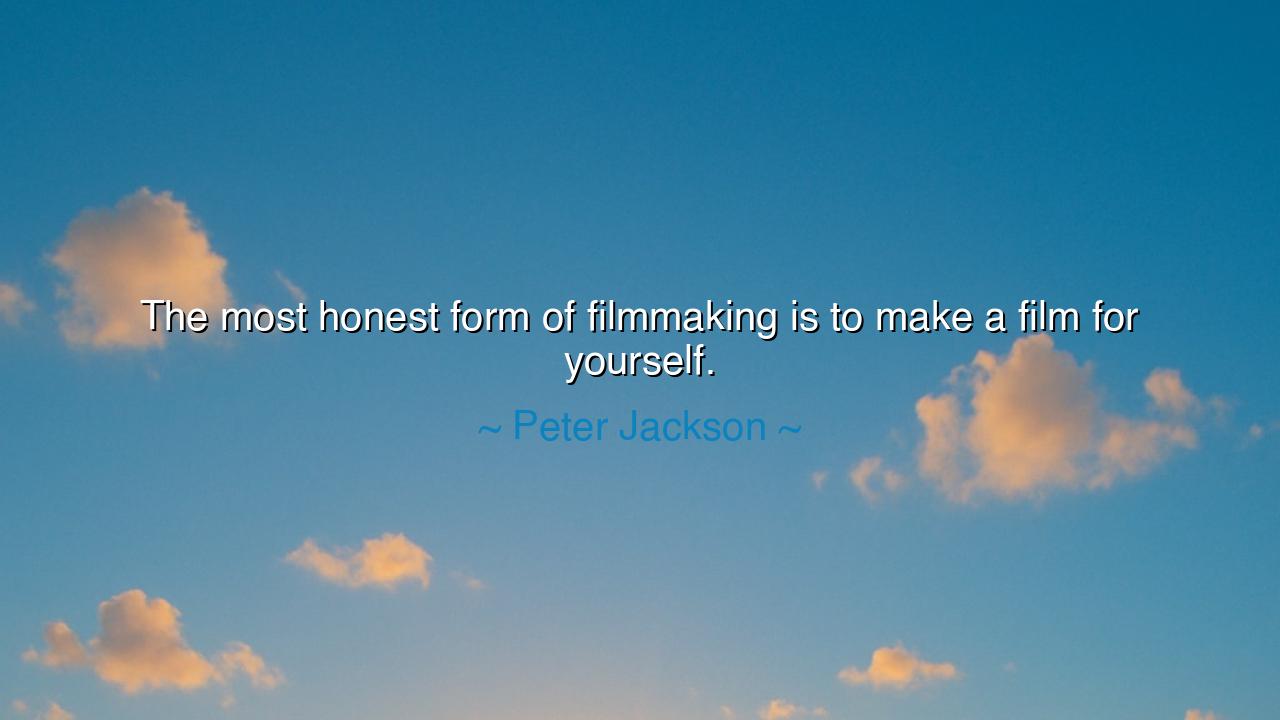
The most honest form of filmmaking is to make a film for






In the words of Peter Jackson, “The most honest form of filmmaking is to make a film for yourself.” This saying, though simple in sound, carries the weight of centuries of human striving, for it speaks of the eternal struggle between truth and falsehood, between inner calling and outward applause. To create for oneself is not an act of selfishness, but of fidelity to the deepest fire within the heart. When one bends his art to the expectations of the crowd, his work may glitter for a season, yet it is hollow; but when he dares to shape it as he himself would behold it, then the work carries the breath of eternity. For honesty in art is the seed from which greatness springs, and the self is the soil where that seed must first be planted.
This truth was known even in the days of the ancients. Did not the sculptor Phidias carve the hidden folds of Zeus’s cloak, though none could see them, because he said, “The gods will know”? So too must the filmmaker, the writer, the creator labor for that unseen witness—the conscience. To make a film for yourself is to resist the chains of public flattery, the endless whispers of critics and financiers, and to honor instead the whisper of one’s own soul. For only then does the work become alive, bearing a voice that others may hear, because it is born from authenticity rather than fear.
Peter Jackson himself lived this teaching. Before the grandeur of The Lord of the Rings, he made films that were strange, wild, and born of his own imagination—films like Bad Taste and Heavenly Creatures. These were not crafted to please the multitudes, but to satisfy his own hunger for story. Had he waited for the approval of the great studios, he might never have dared to tread into Middle-earth. But because he had learned to create first for himself, he carried the courage to attempt the impossible, and in doing so, gave the world a gift beyond price.
The lesson is not his alone. Recall also the tale of Vincent van Gogh, who painted fields of fire and skies of whirling stars though he lived in poverty and obscurity. His canvases were not made to be sold—for few desired them—but to quench the flames within him that demanded expression. Though he was denied honor in life, the truth in his art endured beyond his mortal years, and now countless souls are moved by the honesty of his brush. Here lies the proof: what is born from self-honesty becomes timeless, for truth survives where imitation crumbles.
Yet, let none mistake the teaching. To create for oneself is not to despise others, nor to ignore the world; it is to offer the world something unstained by compromise. The crowd may or may not embrace such a gift, but if the heart of the maker is pure, the work itself becomes a beacon. In a world where voices are many and distractions endless, the most powerful sound is that of a single soul speaking its truth, unafraid, unwavering.
So, what lesson must the seekers of wisdom carry? It is this: listen to the inner voice before the outer noise. Whether you are a filmmaker, a painter, a writer, or merely one who crafts a life, let your choices bear the imprint of your own heart. Do not shape your days merely to please the eyes of others, but to honor the fire that lives within you. For if you live only for the gaze of the multitude, your life will become a mask; but if you live for the truth within, your life itself becomes a work of art.
Practical steps are thus: begin each labor by asking, “What would I create if no one else were watching?” Take time in solitude, away from the judgment of others, and fashion at least one work that answers only to your spirit. Guard against the temptation of hollow applause, and remember that praise fades quickly, but integrity endures. In all your endeavors—be they humble or great—practice this ancient honesty.
And when the storms of doubt arise, recall these words: “The most honest form of filmmaking is to make a film for yourself.” In them lies not only a guide for artists, but for all who walk the earth. For to create for oneself is to live without chains, to speak without fear, and to leave behind a legacy carved not in the dust of public favor, but in the stone of eternal truth.






AAdministratorAdministrator
Welcome, honored guests. Please leave a comment, we will respond soon